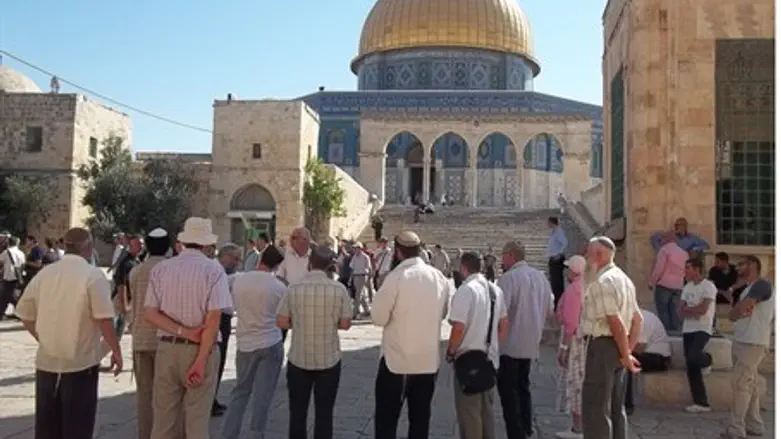
Barely a week goes by without the Temple Mount, Judaism's holiest site, making it into the headlines.
Despite its supreme importance to Jews throughout the world, the Temple Mount - site of the two Holy Temples of Jerusalem and the place where some Jewish traditions say the creation of the world began - is at the center of an ongoing fight for Jewish prayer rights. The Waqf religious trust which administers the site's Al Aqsa Islamic complex refuses to allow any form of non-Muslim worship on the Mount, and Islamist groups have repeatedly threatened - and often carried out - violence over Jewish visits to the site.
As a result, Jews who pray - or are even deemed to be praying by the Waqf's security guards - are often arrested and removed from the Mount, in what Jewish activists have slammed as police "caving in" to Islamists.
But whereas the issue was for a long time considered too much of a religious and political hot potato to be addressed, that now seems to be changing. MKs, Deputy Ministers and even senior government Ministers all regularly ascend the Mount, often exposing themselves to the same levels of harassment that stalwart Temple Mount activists have been putting up with for decades - each time fueling the debate over the Muslim monopoly over the holy site.
In January, a revolutionary bill was tabled to secure equal prayer rights for Jews on the Temple Mount - sparking fury from Muslim MKs.
Much of that progress is due to the work of the Temple Institute, a Jerusalem-based organization dedicated to educating the public about the Temple Mount's Jewish heritage, as well as the Holy Temples themselves. Apart from the literature, lectures and online educational material distributed by the Temple Institute, the organization's grassroots efforts to raise awareness of the discrimination against Jews on the Temple Mount has been key to placing the issue on the national agenda.
This coming Sunday (March 30) the Temple Institute will host its Fifth Annual International Temple Mount Awareness Day, one of the most important awareness-raising initiatives of the year.
"By presenting a selection of individuals who have dedicated their life to The Temple Mount, we allow for a unique experience for thousands worldwide to rediscover their connection to The Holy Temple and Temple Mount through a range of perspectives, views and disciplines," explained Temple Institute International Director Rabbi Chaim Richman.
The Temple Institute says International Temple Mount Awareness Day "seeks to celebrate the promise of the rebuilding of the Holy Temple in Jerusalem and the revolution in Temple consciousness that is taking place in Israel.
"The event also draws attention to the situation on the Temple Mount, the holiest place on earth, where non-Muslims are not permitted to pray, and where a campaign is being waged daily to destroy all existing remnants of the Holy Temple, and to deny that the Holy Temple ever existed."
The four-hour live-stream video broadcast will be hosted live this coming Sunday on Arutz Sheva, from 5:00 p.m. Israel time, (10:00 a.m. EST).
Among other prominent figures and activists, this year’s featured interviews include Knesset Deputy Speaker Moshe Feiglin, who will speak about Jewish prayer rights and Israeli sovereignty on the Temple Mount; and Professor Gabriel Barkay, one of Israel’s foremost archaeologists, who will provide firsthand insight into the ongoing systematic destruction of ancient Temple remnants and artifacts by the Islamic Waqf, in addition to the growing political phenomena of "Temple Denial".
The broadcast will also include a musical performance by Singer-Songwriter, Yitzchok Meir Malek, and a segment on the media’s coverage of Temple Mount issues by Arnon Segal, whose weekly feature in Makor Rishon has helped mainstream the Temple Mount movement in recent years.
It will be rebroadcast for a second showing after a brief interlude to allow the Temple Institute’s worldwide audience maximum convenience.
During both broadcasts, viewers will be able to communicate directly with Temple Institute International Director Rabbi Chaim Richman and Assistant International Director Yitzchak Reuven throughout the streaming webcast, via an open live chat-room.
For Rabbi Richman, Temple Mount Awareness Day marks the start of a "revolution" - which itself starts with undoing what he terms a "historic crime committed against the Jewish people."
"We are witnessing the beginning of a reeducation of the Jewish people, to remind them of their eternal connection to the Temple Mount and the Holy Temples themselves," he says. Following the destruction of the Second Temple in 70 CE, and the onset of a very long and dark exile, Jews began to relate to the concept of the Temple as "something mythical, something off-limits" - a perception which "couldn't be further from the truth," given the centrality of the Temple and Temple service in Jewish Law and Scripture.
And despite the challenges, Rabbi Richman is "extremely optimistic" about the future.
"Today we are witness to a tremendous increase... record numbers of Jews ascending the Temple Mount in purity [i.e. in accordance with Jewish Law - ed.]"
"Especially today we see that even on a political level there are growing numbers of lawmakers and legislatures who are realizing that there's something very wrong with our accepting the status quo" on the Temple Mount, he added.
"More than anything, International Temple Mount Awareness Day is an indicator of the tremendous change that's going on in this generation."
"It's the beginning of the Temple revolution."